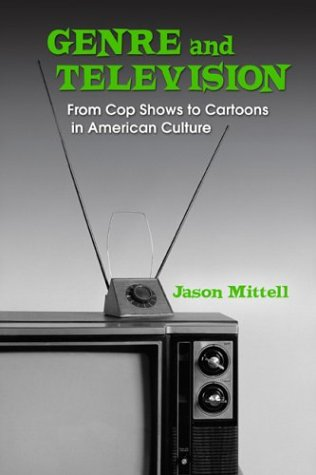Is There a Detective in the House?
by: Chandler Harriss / Alfred University
IN ADDITION TO OUR REGULAR COLUMNISTS AND GUEST COLUMNS, FLOW IS ALSO COMMITTED TO PUBLISHING TIMELY FEATURE COLUMNS, SUCH AS THE ONE BELOW. THE EDITORS OF FLOW REGULARLY ACCEPT SUBMISSIONS FOR THIS SECTION. PLEASE VISIT OUR “CALLS” PAGE FOR CONTACT INFORMATION.

What does the word genre mean? In Genre and Television (2004), Jason Mittell argues the genres should be considered cultural categories and are used to help audiences categorize and make sense of different types of programs. In essence, he contends that genres are not components of texts, but instead are categories of texts generated by audiences. Thus, he denies the text's capacity to fully determine its genre. This is apparent when he writes, “Although genres are categories of texts, texts themselves do not determine, contain, or produce their own categorization…Genres exist only through the creation, circulation, and consumption of texts within cultural contexts” (11). It should be acknowledged that Mittell does agree that structural components may help define a text's genre, but only if the audience recognizes the connection between structure and genre. In the end, it is the audience that wields the generic power.
In contrast, Vladimir Propp (1968) contends in Morphology of the Folktale that genres are recognized by groupings of fixed and constant structures. Propp's argument emphasizes plot structure based on character actions while dismissing character attributes. In other words, Propp would likely argue that Mittell's acceptance of popular beliefs will deny the pursuit of a structure's genesis and will fail to recognize when a structure has been adapted for a new and novel presentation. In other words, dressing up textual structures in new clothes does not change the genre it merely defamiliarizes it. This leads to the false belief that there are more genres than actually exist. Ronald Tobias (1993) takes up this issue in 20 Master Plots. In Proppian terms, some popularly accepted genres like Westerns might not be genres at all. We need to look no further than the multiple structures Will Wright attaches to Westerns in Sixguns and Society (1975) to see that the Western structure is not stable or fixed in the way that Propp requires.

At the root of debate is a fundamental discussion over what the word genre means and in many respects both Propp and Mittell are absolutely correct. The answer to this dilemma might be as simple as dividing the term genre into multiple components with different, yet specific, purposes. I suggest that we begin to think of structural genres and cultural genres as equally acceptable categorizations. In short, it should be acceptable for one program to be defined differently depending on the purposes of the scholar; this may even lead to other uses of the word such as stylistic genres where film noir springs directly to mind. It might also be expected that the text's structure will influence the cultural categorization, as Mittell suggests in his discussion of police programs. For example, programs like CSI, Crossing Jordan, and Dexter take what Tobias (1993) calls the “riddle” plot a few steps away from the prototypical “cop show” by divorcing their lead characters from guns and the physical apprehensions of criminals. However, these characters still carry badges and many of the discourses embedded within these shows are linked directly to their representations of the State. On the other hand, a program like House uses the very same plot structure, but in large measure divorces its discourses from the cop show. Of course, some discourses are present across these boundaries. House, CSI, Dexter, and Crossing Jordan all place the scientific discourse in the foreground, but unlike the others House possesses no discourse of justice and provides viewers with no representation of the State. This has led some reviewers like Diane Werts of Newsday (2005) to tag its genre as a medical mystery.

It would be difficult for Mittell to argue that House is part of the same genre as Dragnet, but it would be quite simple for Propp to illustrate that it is. This is precisely why scholars need to stop the debate about what the single word (genre) means and begin to qualify it. The idea behind a generic categorization called medical mystery implies this distinction while simultaneously conflating it. Medical is based on the show's setting and its characters' attributes. However, mystery is based on the structure of the plot. In short, House is not a “cop” show, but it is very much structured like one. In fact, Paul Attanasio the executive producer of over 50 episodes of House cut his teeth as a writer for the critically-heralded cop show Homicide: Life on the Streets so there is no surprise how strikingly similar the plots' structures are.
In the end my point is simple, the multiple levels (plot structure, style, and ideology) of any televisual text require us to think about genre on multiple levels. In the song “Achin' to Be” Paul Westerberg and his band The Replacements sung, “In a black and white picture there's a lot of grey bunk.” These lyrics could easily be applied to the discussion of genre. It is not black and white and likely never will be, but this is not an indictment on using generic categories. We can define the grey bunk even if we focus on different levels of greyness. This essay is simply a recognition that most generic categories never have been and never will be universally accepted. It is interesting that Mittell devotes just over 200 pages to his discussion of generic delineations, but never successfully answers the question that opens his book. Is Northern Exposure a sitcom or a drama? Can the answer be both or is it neither?
Works Cited
Mittell, Jason. Genre and Television: From Cop Shows to Cartoons in American Culture. New York: Routledge, 2004.
Propp, Vladimir. Morphology of the Folktale. Trans. Lawrence Scott. Second ed. Austin TX: University of Texas Press, 1968.
The Replacements. Achin' to Be. Compact Disc. Sire Records, 1989.
Werts, Diane. “Glued to the Tube “House” Riding High…” Review. Newsday September 12, 2005, sec. Entertainment.
Wright, Will. Sixguns & Society: A Structural Study of the Western. Berkeley, CA: University of California Press, 1975.
Image Credits:
1. Genre and Television
2. Western
3. House
Please feel free to comment.
Generic specificity or cultural complexity?
Thanks for the provocative post, Chandler. You raise a number of useful points about the critical use of genre. I think your point about the need to qualify broad generic categories for the sake of critical specificity is a good one. And your point about the co-existence of both structural and cultural components of genres is well-made. But I’d like to register some questions about your reading of Jason Mittell’s argument. My own understanding is that Mittell argues for engaging with the “cultural life” of genres. By this I understand him to mean that generic categories are historically specific, discursive structures that are both mutable over time and contested at any given moment. The point is not to settle ultimately on a single definition (is Northern Exposure a comedy or drama?) but to chart the ways in which those generic classification have been activated within certian conditions. Also, I would argue that Mittell is concerned with much more than the audience with regard to generic classification: he identifies networks, producers, regulators, and academics among others as all having a stake in this discursive process. Finally, I see Mittell’s move as decidedly away from the structuralism (some say ritualism) of Propp and Wright in order to emphasize the fluidity of genric categories and thier centrality in the cultural function of television. I do like your point about simultaneously marking and conflating generic distinctions in shows like House through the use of qualifiers; it has a certain critical and heuristic value. But that kind of delineation is not what I understand Mittell to be talking about.
And the ladies…
I agree, it is useful and necessary to qualify one’s use of terms such as “genre,” as well as the more specific, yet still ambiguous “mystery,” “cop show,” etc. Having only seen a few episodes of House, I am curious about how much Dr. House can be seen as separate from the State– it seems as if the hospital he works for is a state institution – and in this sense, does the show reinforce the efficieny of the State through this highly skilled, no-nonsense doctor who forcefully cuts through bureaucracy to get to the bottom of his patients’ afflictions? I wonder how shows like Ghost Whisperer, Medium, and even Murder She Wrote can also be seen as variations of the traditional “cop show” with their investigators whose professions are even more so distanced from the State.
Genres
Harris raises a lot of good points regarding the rigid nature of the word genre. As TV continues to stretch the boundaries of creativity one-dimensional categories are not going to define the multiple aspects of dynamic shows which truly blend different styles with content from different genres. “Reality TV” often gets thrown around as an umbrella genre, when in fact there are so many sub-genres within that category, it’s hard to argue that Big Brother is anything like Iron Chef or Project Runway be considered the same genre as Survivor. There is indeed a need for more fluid definitions of genre, TV is too complicated to fit shows into neat little boxes.
A thanks & reply
I just wanted to thank Chandler for his thoughtful engagement with my book, and the other commenters engaging in the conversation. I posted a lengthy reply on my own blog at http://mt.middlebury.edu/middb.....out_1.html – I encourage anyone interested to migrate there to comment further.-Jason
Pingback: House, MD | The Heart is a Lonely Hunter
Pingback: Turning Holmes Into a House « Seen from the Sofa